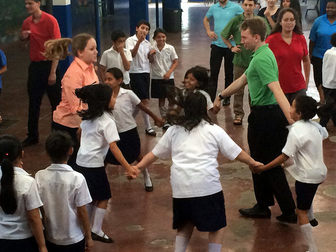
Is It Worth It?
I'm preparing to go on another short-term mission trip. By the time you read this, I’ll be on my way home from Malaysia with at team of twenty-six students and faculty serving with our Christian brothers and sisters there. While we’re there, we’ll teach three, two-day music and worship workshops in which our students will offer eleven different sessions from guitar to song leading to basic worship philosophy. We will also offer music that we’ve learned in the last several months – both songs from our country and others but, most importantly, music from the Malaysian culture that our students have transcribed from oral sources and arranged for our pick-up choir. As you can imagine, we’ll also enjoy this beautiful country, its natural beauty, and its delectable cuisine.
Each year as I prepare to take students to other countries for music and missions engagement, the question comes up about whether all of this is worthwhile. Is the financial and human capital that we invest worth what is accomplished? Could the money be invested toward training by local leaders or by enhancing existing in-country structures?
I'm preparing to go on another short-term mission trip. By the time you read this, I’ll be on my way home from Malaysia with at team of twenty-six students and faculty serving with our Christian brothers and sisters there. While we’re there, we’ll teach three, two-day music and worship workshops in which our students will offer eleven different sessions from guitar to song leading to basic worship philosophy. We will also offer music that we’ve learned in the last several months – both songs from our country and others but, most importantly, music from the Malaysian culture that our students have transcribed from oral sources and arranged for our pick-up choir. As you can imagine, we’ll also enjoy this beautiful country, its natural beauty, and its delectable cuisine.
Each year as I prepare to take students to other countries for music and missions engagement, the question comes up about whether all of this is worthwhile. Is the financial and human capital that we invest worth what is accomplished? Could the money be invested toward training by local leaders or by enhancing existing in-country structures?
These questions and many others are worth considering. Recently, a post by blogger Pippa Biddle has received quite a bit of attention and many reposts on social media for her perspectives on this subject. This blogger chronicles her short-term mission experience and surmises that it was not worth it nor does she believe that such experiences are beneficial for others. In response to Pippa’s post, a former Baylor student who traveled with a team I lead to Kenya in 2007 offers a very different perspective, and I urge you to read her inspiring story. Both of these blogs and conversations I’ve had through the years with students, colleagues, and parents have caused me to think more deeply about short-term experiences and their ultimate worth. Here are a few of my observations:
Getting Perspective Perhaps the most significant aspect of my traveling to other countries and participating with them in the work that they are doing is the perspective that I gain. Often, in spite of my intentional efforts to see the big picture, I focus on the minutia of my own local context and the problems and challenges that face my students, my institution, my family, and my church. I easily lose sight of my place in the larger context of God’s kingdom. I forget the smallness of the dot that my place represents.
When I travel to other countries and interact with Christians there, I am reminded that God is alive and at work all over the world and that God is doing an equally important (but often different) work among them. In response, the challenge of my context (locally or even nationally) comes into clearer focus when I place it in the context of what God is doing among others.
The Results of Transformation From having traveled with students on nearly a dozen such experiences through the years, I have seen first-hand the transformation of lives that always occurs on these trips – see Joanie’s blog above. With few exceptions, students return to the U.S. (or to other home countries), and they view their lives differently – they are able to imagine themselves as world citizens, they are differently appreciative of their own life situations, they are less materialistic, and they are more generous to others.
As a result, they think more deeply about how they spend their money, how and where they invest their lives, and whether what they do matters and for whom. As years pass, they make different decisions about whom they marry and how they raise their children. Their faith is impacted as they become advocates for those who have less than they and for those whose voices are often absent from many conversations in our culture and around the world.
Relationships Are Established There is no substitute for knowing someone in another culture. When you have a true and trusted friend in another culture, you read news reports differently, you pray with different perspectives, and you advocate in fresh ways.
I will always remember one of my first such experiences was in traveling to the former Soviet republic of Kazakhstan prior to the break up of the Soviet Union. Upon arriving in this country that I had never heard of until a few months before traveling, the stories of the friends I began to make quickly started to unravel the life-long propaganda that had been poured into me during my upbringing in the Cold War era. Within days, the stereotypes I had been taught started to crumble, and the assumptions that I had made about people from this part of the world could not be validated.
As a result, my world shifted, and I was different because of relationships. However, not only did my perspective change about people from Russia and Kazakhstan, these encounters caused me to think of people from all over the world in new ways.
Parting Thoughts What does this discussion have to do with those of us who do not take groups on short-term mission trips to other countries? What are the implications for ministry in your local context?
For starters, we can pray for and support others who are going on such trips, and we, our churches, and ministries can grow as a result of engaging with their experiences and stories. Likewise, we can be alert to ways in which we might travel a long distance without actually going outside our city. By engaging with people who are different from us, we can learn to imagine our own context differently and gain new perspectives.
Also, we can encourage people in our own ministries and contexts to live missional lives in which we discover new ways to take music outside the walls of the church and join the work that God is doing outside the church. Lastly, we can be a catalyst for relationship building among those in our congregation. We can find ways that stories can be shared either in small groups or in corporate worship that allow us a glimpse into a world that is much different from the one in which we live each day. At the end of the day, leading out and facilitating life-altering encounters with Christ is the call to which each of us must respond.
Getting Perspective Perhaps the most significant aspect of my traveling to other countries and participating with them in the work that they are doing is the perspective that I gain. Often, in spite of my intentional efforts to see the big picture, I focus on the minutia of my own local context and the problems and challenges that face my students, my institution, my family, and my church. I easily lose sight of my place in the larger context of God’s kingdom. I forget the smallness of the dot that my place represents.
When I travel to other countries and interact with Christians there, I am reminded that God is alive and at work all over the world and that God is doing an equally important (but often different) work among them. In response, the challenge of my context (locally or even nationally) comes into clearer focus when I place it in the context of what God is doing among others.
The Results of Transformation From having traveled with students on nearly a dozen such experiences through the years, I have seen first-hand the transformation of lives that always occurs on these trips – see Joanie’s blog above. With few exceptions, students return to the U.S. (or to other home countries), and they view their lives differently – they are able to imagine themselves as world citizens, they are differently appreciative of their own life situations, they are less materialistic, and they are more generous to others.
As a result, they think more deeply about how they spend their money, how and where they invest their lives, and whether what they do matters and for whom. As years pass, they make different decisions about whom they marry and how they raise their children. Their faith is impacted as they become advocates for those who have less than they and for those whose voices are often absent from many conversations in our culture and around the world.
Relationships Are Established There is no substitute for knowing someone in another culture. When you have a true and trusted friend in another culture, you read news reports differently, you pray with different perspectives, and you advocate in fresh ways.
I will always remember one of my first such experiences was in traveling to the former Soviet republic of Kazakhstan prior to the break up of the Soviet Union. Upon arriving in this country that I had never heard of until a few months before traveling, the stories of the friends I began to make quickly started to unravel the life-long propaganda that had been poured into me during my upbringing in the Cold War era. Within days, the stereotypes I had been taught started to crumble, and the assumptions that I had made about people from this part of the world could not be validated.
As a result, my world shifted, and I was different because of relationships. However, not only did my perspective change about people from Russia and Kazakhstan, these encounters caused me to think of people from all over the world in new ways.
Parting Thoughts What does this discussion have to do with those of us who do not take groups on short-term mission trips to other countries? What are the implications for ministry in your local context?
For starters, we can pray for and support others who are going on such trips, and we, our churches, and ministries can grow as a result of engaging with their experiences and stories. Likewise, we can be alert to ways in which we might travel a long distance without actually going outside our city. By engaging with people who are different from us, we can learn to imagine our own context differently and gain new perspectives.
Also, we can encourage people in our own ministries and contexts to live missional lives in which we discover new ways to take music outside the walls of the church and join the work that God is doing outside the church. Lastly, we can be a catalyst for relationship building among those in our congregation. We can find ways that stories can be shared either in small groups or in corporate worship that allow us a glimpse into a world that is much different from the one in which we live each day. At the end of the day, leading out and facilitating life-altering encounters with Christ is the call to which each of us must respond.

 RSS Feed
RSS Feed